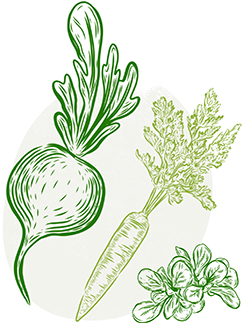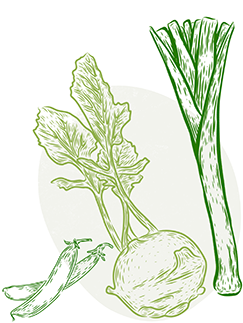The History of The National Allotment Society
With our origins dating back to 1901, The National Allotment Society have been at the forefront of the allotment movement for over 100 years.
The origins
The National Society of Allotment and Leisure Gardeners Limited was formed on the 10th March, 1930. The Society’s roots or parentage are from the founding in April 1901 of “The Agricultural Organisation Society’.
The objects and aims of the A.O.S. were cooperation amongst agriculturists by organising and establishing co-operatives, farming land, machines, animals, food markets and also to organise small holdings and allotments. The A.O.S. was prominent in the legislation which emerged as the 1908 Small Holding & Allotment Act. Such was the growth of the A.O.S. that in 1917 it responded to the need to reform.
The A.O.S flourished seeing many achievements such as the success of creating District Bodies, Federations and Councils, plus the improvements by way of the Allotments Acts 1922, although these did not provide general satisfaction due to parties concerned not administering in the spirit of its promoter.
The agricultural rates act
The Agricultural Rates Act 1923 and income tax relief on sales were two other moderate achievements to aid Allotments. In 1924, it was seen that change was imminent. Great advances were made in respect of Land Renting Societies, where Local Authorities were beginning to see the wisdom of handing over their Allotments to properly constituted societies for administration.
A report in 1925 highlighted the decrease in the number of Allotment Associations due to the large number of temporary sites required for building with no alternative land available; plus the unfortunate industrial conditions which had prevailed for so long in the Coal Mining and Ship Building Districts, preventing many allotments holders from affording the rent of a plot and Affiliation Fee.
The amalgamation of two societies
On 10th March 1930, the two Societies, the National Union of Allotment Holders Limited and the Allotment Organization Society; amalgamated under the joint title of the National Allotment Society Limited, with the President, Sir Francis Dyke Acland.
When the amalgamation took place the new Society took over the assets and liabilities of the two old Societies. On the income/expenditure account ending 31st December 1930, there was a net Loss of £137.2s.ld, with a credit balance of £26.4s.11/2d. remaining.
The main concern for the Society was to help a scheme of assistance for the unemployed and partly employed. Assistance came from the Ministry of Agriculture, after seeing the results of help from the Mansion House and the Society of Friends. In the winter of 1930, 64,000 families were helped.
Poster image: The Garden Museum
Digging for victory
It is recorded that in 1920, Membership had been 1,330,000 and in 1930, 965,000. Many organisations worked with the N.A.S. during 1939 to 1945, in the “Dig for Victory” Campaign, assisting thousands of needy Allotment Holders each year. One other tremendous task was the distribution of seeds from America, 150,000 collections of seeds (over 100 tonnes) amongst 1,500,000 gardeners, plus seeds from Canada, Australia, Tanganyika and the commonwealth. .
The N.A.S. for many years conducted a National Allotments Amenity Competition, in order to back up the many local efforts made to improve the appearance of Allotments. The President, Sir Francis Dyke Acland, provided a magnificent Fifty-Guinea Silver Challenge Cup as the Principal Trophy. The object of the Competition was to improve the appearance of Allotments generally and the cup was awarded to the area which effected the greatest improvement in the course of the year. Other prizes were also donated to the N.A.S., for other sections of the competition. These three major trophies are still awarded for the Local Authority Competition.
With its awareness of problems and attitudes in the past, the Society took steps in 1941 to prepare a constructive Allotment Policy which it hoped would find place in post war reconstruction.
Name change
In 1946, the Society changed its name to National Allotment and Garden Society. In 1947, an Allotment Holders Charter was prepared and published. After three years agitation, a Bill was brought to Parliament, which resulted in the Allotment Act 1950.
The post war years again saw a rapid decline in Allotments and membership as a result. 1951 the “Village Produce Association” became attached to the N.A.G.S title after amalgamation with the Central Committee of Village Produce Associations as a method of distributing aid to rural areas. In the mid 70s a change in the title to National Society of Leisure Gardeners Limited and 1979 to its present title, the National Society of Allotment and Leisure Gardeners Limited.
The Society contributed considerable material to Professor Thorpe, who produced a report which was presented to Parliament in 1969 but never debated. “Continental” style sites have never been fully accepted or desired by most Allotment Holders or Local Authorities.
Land planning bill
1980 saw the Land Planning Bill through Parliament and there is no doubt the vast numbers of letters from Societies and the intense lobbying by Representatives, played a major part in at least retaining the need for Local Authorities to seek permission of the Secretary of State to dispose of Allotments. During the 80’s the National Society’s organisation, structure and Headquarters changed considerably.
The sale of the Flitwick Site and Premises, which was in need of extensive and costly repairs, provided much needed capital to enable the Society to purchase a purpose built office, in Corby, Northamptonshire, and modern equipment. The balance from the sale being invested to provide funds to ensure a long term future for the Society.
It must be acknowledged that the original purchase of the Flitwick premises was possible, due to the generous assistance of Ted O’Dell who provided the premises on an interest free mortgage. In appreciation of his help, the Corby Office, the new Headquarters, was named O’Dell House.
With the introduction of computers, some time consuming operations being carried out “off site” and the transfer of some of the workload to the Regions, (which had been reduced to ten) resulted in a reduction of salaried staff.
Generally, a gradual decline in demand for Allotments added to pressure from developers, together with neglect by some Local Authorities, has caused many sites to be under-occupied. This resulted in a considerable number of allotments to disappear.
The return of a regular contact with Affiliated Societies and Members in 1987, by way of a quarterly journal, had been brought about after several attempts to be supplied by outside companies failed. The articles are compiled ‘In-House’ on all aspects of the Society, hints and tips for growing, Regional News, Regular Features, etc., from contributions submitted by Officers and Members.
In 1997, the Society completed a national survey of allotment gardens (with grant funding from the Department of the Environment) which provided the first comprehensive data on allotments for over 20 years. NSALG definitely has a future as there is as much, if not more, of a need for a united voice to protect and preserve a traditional way of life which is as relevant today as it was in the beginning.
Timeline
April 1901
The Agricultural Organisation Society is formed
1917
Allotment & Smallholding Department formed under the direction of The Right Hon. F. D. Acland M.P., who was appointed Chairman.
1918
Membership had risen to 436 Societies, with 72,989 members.
1922
The Allotments Acts 1922 is introduced
1923
The Agricultural Rates Act 1923 and income tax relief on sales introduced
1924
Advances were made in respect of Land Renting Societies, where Local Authorities were beginning to see the wisdom of handing over their Allotments to properly constituted societies for administration.
The Allotment Organisation Society and the Smallholders Limited were brought into existence at a Conference held on 19th September, 1924.
1930
On the 10th March, the National Union of Allotment Holders Limited and the Allotment Organisation Society amalgamated under the joint title of the National Allotment Society Limited
1939 - 1945
In the “Dig for Victory” Campaign, assisting thousands of needy Allotment Holders each year.
1941
The NAS prepared a constructive Allotment Policy which it hoped would find place in post war reconstruction.
1946
the Society changed its name to National Allotment and Garden Society
1947
An Allotment Holders Charter was prepared and published
1950
Allotment Act 1950 is introduced
1951
The “Village Produce Association” become attached to the NAS title as a method of distributing aid to rural areas.
1979
The society had a final change of title to its present title, the National Society of Allotment and Leisure Gardeners Limited
1980s
In the 1980’s the National Society’s organisation, structure and Headquarters changed considerably with the sale of the Flitwick Site and move to Corby. The original purchase of the Flitwick premises was possible, due to the generous assistance of Ted O’Dell who provided the premises on an interest free mortgage. In appreciation of his help, the Corby Office, the new headquarters, were named O’Dell House.
1987
Saw the return of regular contact with Affiliated Societies and Members in by way of a quarterly journal.
1997
The Society completed a national survey of allotments which provided the first comprehensive data on allotments for over 20 years.
2002
The first National Allotments Week was held - helping to grow interest in allotment gardening.
2011
HM King Charles III became patron and interest in allotments reaches a high of 57 people waiting for every 100 plots.
2011/12
The Government carried out a review on all statutory provisions of LA - the section 23 1908 Act was under threat. NAS rallied the membership eliciting a huge response from the allotment movement. The Government agreed that the provision would remain..
2012
The society which had used various titles over the previous years adopted the trading name of National Allotment Society (NAS) but still operates as a cooperative under NSALG Ltd.
2016
The NAS created New Rules for operating as a co-operative under the new legislation and improved governance procedures.
2019/20
The Society concentrates on the provision of training for members, installs a new database to streamline all office procedures and continues to improve communications with members and stakeholders.
2020/21
NAS works with Government to ensure allotments remain open for gardening during Covid-19 lockdown.
2024
King Charles III announces his continued patronage with the NAS.



